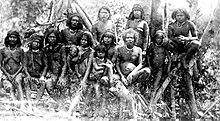- Nicobarese people
-
Nicobarese Regions with significant populations Nicobar Islands Religion Christianity (98%), Islam (2%) (Both Christian and Muslim Nicobarese incorporate elements of their primitive animistic religion in their worship)[1]
Related ethnic groups Shompen people
The Nicobarese people are a Mon–Khmer-speaking people of the Nicobar Islands, a chain of 19 islands in the southeastern Bay of Bengal. Only 12 of the 19 islands are inhabited. The largest and main island is Great Nicobar. The term Nicobarese refers to the dominant tribes of the Nicobar Islands. On each island, the people have specific names, but together they are the Nicobarese. They call themselves Holchu, which means "friend".[citation needed]
Contents
History
The Nicobarese may not have been the first people to live in the islands, they appear to have shared the islands with those of Malay descent and then as years passed the Shompen came to the islands. The islands have been under the power of various Asian empires in the 16th century, Great Britain from 1869–1947, and India from 1947. Today they are administered by India as part of the Union Territory of the Andaman and Nicobar Islands.
Language
The Nicobarese language is part of the Austro-Asiatic language family. All of the different islands speak different dialects of the Nicobarese language. The separate islands are categorized into four groups, although most of the people understand the Car Nicobar dialect.
Religion
Most of the people of the islands are of the Christian religion, which was taught to them by a man named John Richardson who translated the New Testament into Nicobarese. Besides Christianity, other Nicobarese follow the traditional religion of the islands, which is animistic in nature. They believe in spirits, ghosts, and the existence of the soul. A person becomes a ghost after their death when their soul leaves their body and the ghosts of all the Nicobarese are all around the islands. They believe that the spirits are responsible for all of the unfortunate occurrences on the islands, in the event of which shamans are called upon to handle the bad spirits.
Society
The Nicobarese are headed by a chief called "Rani" or "queen". The first Rani of the Nicobarese was Islon who married Mewalal, tahsildar of Nancowry in 1941-42, and became the most influential person in the Nicobar Islands.[citation needed] On her death in 1954, Islon was succeeded by her daughter Lakshmi, the incumbent Rani of Nicobar, who subsequently converted from Hinduism to Islam and assumed the name "Ayesha Jhulaikha".[citation needed]
On the Nicobar Islands, men and women have approximate equal status. The women have a lot to do with their own choice of husbands, and after marriage they are free to live with either of the couples parents. The Nicobarese men value the women economically because they not only take care of household duties, but also tend to the plantations and gardens.
The villages on the islands consist of sporadically placed huts strewn about in designated areas. The huts are normally round with dome shaped roofs. They are typically lifted up from the ground and they have ladders that they climb up to get into the huts that they bring in at night.
Economy
The Nicobarese have a traditionally horticultural economy, they base their monetary existence on the growing of coconuts, pandanus, areca nut palms, bananas, mangoes, and other fruits. They also hunt, fish, raise pigs, make pottery, and make canoes. Many of the older Nicobarese are illiterate, however today the younger Nicobarese receive free education through the government. As more Nicobarese become educated they receive jobs as teachers and clerks, among other occupations.[2]
See also
- Shompen people
- Nicobar Islands
- Nicobarese languages
References
- ^ Kapoor, Subodh (2002). The Indian Encyclopaedia. 1. Genesis Publishing Pvt Ltd. p. 5206. ISBN 8177552570, ISBN 9788177552577.
- ^ Naveen Kumar, Bangalore Frazer Town IInd Cross Wheelers Road Pl
External links
- "Nicobarese and Shompen". The Andaman Association. http://www.andaman.org/NICOBAR/text.htm. Retrieved July 2011.
Categories:- Ethnic groups in the Andaman and Nicobar Islands
Wikimedia Foundation. 2010.

